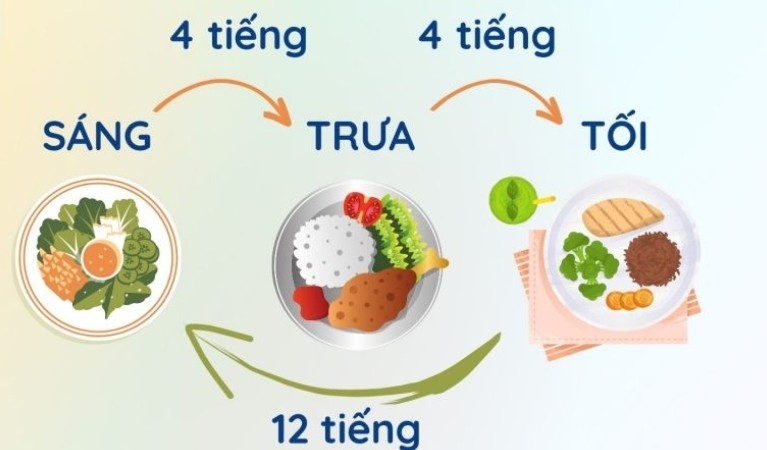
Some popular ways to practice intermittent fasting
- 16/8 method: You will fast for 16 hours and eat during the remaining 8 hours. For example, you can eat between 12pm and 8pm and fast from 8pm to 12pm the next day.
- 5:2 method: in 7 days, you eat normally for 5 days and limit calories (about 500-600 calories) for the remaining 2 days, not continuously.
- Alternate day fasting: you eat normally one day, then fast or eat very little the next day, and repeat this cycle.
- One meal a day (OMAD) method: You eat only one meal a day, usually at a fixed time, and fast for the rest of the day.
Benefits of Intermittent Fasting
Helps lose weight:
Intermittent fasting can be effective for weight loss because you limit your daily calorie intake by eating only during certain hours. When you limit your eating times, you tend to consume less food, resulting in a reduction in your overall calorie intake.
Additionally, during fasting, the body switches from using glucose for energy to using stored fat, helping to burn excess fat.
Improve metabolism:
Intermittent fasting can improve insulin sensitivity, reducing the risk of type 2 diabetes. When the body does not have to constantly digest food, insulin will gradually decrease, making it easier for cells to receive glucose.
Improve heart health:
Some studies show that intermittent fasting can reduce bad cholesterol (LDL), blood pressure and blood sugar levels, thereby helping to reduce the risk of cardiovascular disease.
Enhances the body's self-repair process:
When you fast, your body has time to repair and remove damaged cells, stimulating the regeneration of new cells. This can help improve overall health and longevity.
Brain Support:
Some studies show that fasting can help increase the production of the hormone BDNF (Brain-Derived Neurotrophic Factor), which is beneficial for nerve cell growth and the ability to learn and remember.
Improve energy levels and concentration:
Some people feel less tired and more focused when practicing intermittent fasting, since the body does not have to constantly digest food.

Notes on intermittent fasting
Not suitable for everyone:
Intermittent fasting may not be suitable for people with medical conditions such as diabetes, low blood pressure, pregnant or breastfeeding women, children, or people with psychological problems (such as eating disorders).
People who work hard or exercise vigorously may also feel low in energy if they fast for too long.
May cause feeling hungry, tired, or irritable:
Especially when you first start, you may feel hungry, tired or irritable because your body is not used to not eating at certain times.
Not a magic method:
Intermittent fasting can help with weight loss and improved health, but it's not a miracle cure. Maintaining a healthy diet and regular physical activity are still important factors in maintaining good health.
Requires patience and adjustment:
Everyone is different, so intermittent fasting may work differently for different people. If you decide to try this method, listen to your body and adjust it to suit your individual needs.
Intermittent fasting can have many health benefits, especially for weight loss, improved metabolism, and heart health. However, it is not a “cure” for all health problems and is not suitable for everyone. Before starting intermittent fasting, you should consult your doctor to make sure it is suitable for your health condition.
Source: https://kinhtedothi.vn/nhin-an-gian-doan-co-loi-ich-va-rui-ro-gi.html





![[Photo] Prime Minister Pham Minh Chinh receives Mr. Jefferey Perlman, CEO of Warburg Pincus Group (USA)](https://vstatic.vietnam.vn/vietnam/resource/IMAGE/2025/4/18/c37781eeb50342f09d8fe6841db2426c)

![[UPDATE] April 30th parade rehearsal on Le Duan street in front of Independence Palace](https://vstatic.vietnam.vn/vietnam/resource/IMAGE/2025/4/18/8f2604c6bc5648d4b918bd6867d08396)







![[Video] Doctors, pharmacists, and medical staff are not allowed to advertise functional foods.](https://vstatic.vietnam.vn/vietnam/resource/IMAGE/2025/4/19/f08666d51bdb40a495cc27e0ba1bbbfc)




















































































Comment (0)